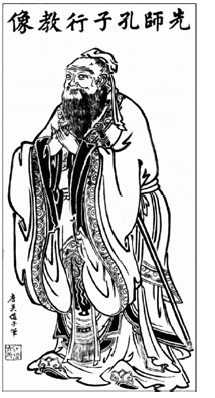Confucius was an ancient Chinese thinker, reported to have lived between 551 and 479 BCE. His thoughts were written down many years after his death in the form of a series of sayings. Although a philosopher rather than a religious figure, Confucius’ thought has at times been used to build a moral framework of right living that is quasi-religious in character. The teachings of Confucius are based on reasoned argumentation, and the absorption and acceptance on the part of learners of the wisdom this reasoning.

Yen Yuan, in admiration of the Master’s doctrines, sighed and said, “I looked up to them, and they seemed to become more high; I tried to penetrate them, and they seemed to become more firm; I looked at them before me, and suddenly they seemed to be behind.
Confucius said, “Those who are born with the possession of knowledge are the highest class of men. Those who learn, and so readily get possession of knowledge, are the next. Those who are dull and stupid, and yet compass the learning, are another class next to these. As to those who are dull and stupid and yet do not learn; they are the lowest of the people.”
Confucius said, “The superior man has nine things which are subjects with him of thoughtful consideration. In regard to the use of his eyes, he is anxious to see clearly. In regard to the use of his ears, he is anxious to hear distinctly. In regard to his countenance, he is anxious that it should be benign. In regard to his demeanor, he is anxious that it should be respectful. In regard to his speech, he is anxious that it should be sincere. In regard to his doing of business, he is anxious that it should be reverently careful. In regard to what he doubts about, he is anxious to question others. When he is angry, he thinks of the difficulties his anger may involve him in. When he sees gain to be got, he thinks of righteousness.”
Tsze-hsia said, “The superior man undergoes three changes. Looked at from a distance, he appears stern; when approached, he is mild; when he is heard to speak, his language is firm and decided.”
Tsze-hsia said, “The superior man, having obtained their confidence, may then impose labors on his people. If he have not gained their confidence, they will think that he is oppressing them. Having obtained the confidence of his prince, one may then remonstrate with him. If he have not gained his confidence, the prince will think that he is vilifying him.”
Mang I asked what filial piety was. The Master said, “It is not being disobedient.”
Chi K’ang asked how to cause the people to reverence their ruler, to be faithful to him, and to go on to nerve themselves to virtue. The Master said, “Let him preside over them with gravity; then they will reverence him. Let him be final and kind to all; then they will be faithful to him. Let him advance the good and teach the incompetent; then they will eagerly seek to be virtuous.”
Things have their root and their branches. Affairs have their end and their beginning. To know what is first and what is last will lead near to what is taught in the Great Learning.
The ancients who wished to illustrate illustrious virtue throughout the kingdom, first ordered well their own States. Wishing to order well their States, they first regulated their families. Wishing to regulate their families, they first cultivated their persons. Wishing to cultivate their persons, they first rectified their hearts. Wishing to rectify their hearts, they first sought to be sincere in their thoughts. Wishing to be sincere in their thoughts, they first extended to the utmost their knowledge. Such extension of knowledge lay in the investigation of things.
Things being investigated, knowledge became complete. Their knowledge being complete, their thoughts were sincere. Their thoughts being sincere, their hearts were then rectified. Their hearts being rectified, their persons were cultivated. Their persons being cultivated, their families were regulated. Their families being regulated, their States were rightly governed. Their States being rightly governed, the whole kingdom was made tranquil and happy.
From the Son of Heaven down to the mass of the people, all must consider the cultivation of the person the root of everything besides.
Confucius. c.500 BCE-a. The Analects. MIT Internet Classics Archive.Chapters 5, 6, 16, 19, 2.
—. c.500 BCE-b.The Great Learning.MIT Internet Classics Archive. 3–6.
